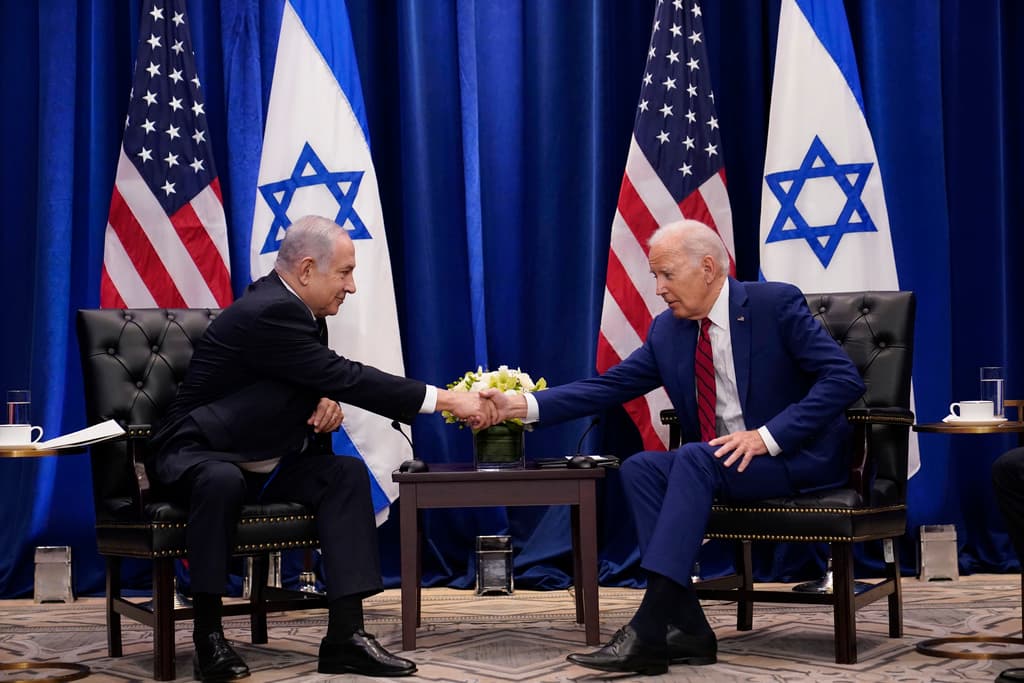Biden Delivers Blunt Speech Backing Israel and Warning Its Enemies on Taking Advantage — ‘Don’t’
America moves the USS Gerald R. Ford and its carrier strike group into the eastern Mediterranean and Biden vows more assets ‘as they’re needed.’

Testing the limits of President Biden’s resolve, Iran’s most prized proxy, Hezbollah, is slowly escalating attacks on northern Israeli towns.
In one of the most pro-Israel speeches ever delivered at the White House following a phone conversation with Prime Minister Netanyahu, Mr. Biden cautioned Iran and Hezbollah Tuesday against joining the war Hamas launched against Israel Saturday.
America has “enhanced our military posture in the region to strengthen our deterrence,” Mr. Biden said. He marked that the Pentagon moved United States Ship Gerald R. Ford and its carrier strike group to the eastern Mediterranean, adding that “we stand ready to move additional assets as they’re needed.”
To “any country, any organization, anyone seeking to take advantage of the situation, I have one word: Don’t,” Mr. Biden said, in what is being taken in the Middle East as a clear reference to Iran and Hezbollah.
The national security adviser, Jacob Sullivan, added later that the naval force was not sent to the Mediterranean to confront Hamas, but to “deter others in the region.”
Yet, earlier in the week a large number of Israeli residents living in small communities near the Lebanese border were asked by authorities to leave their homes and move to safer areas. On the Lebanese side, many civilians living in Shiite villages near the Israeli border have fled north.
A salvo of mortars was launched from Lebanon toward the Galilee Tuesday, intensifying sporadic attacks on Israel since Sunday. A Lebanese-based Hamas faction claimed responsibility for the attack. Yet Israel considers Hezbollah responsible for any fire from Lebanon, and it attacked some of its bases from the air.
Retaliating against a mortar salvo on Monday, the Israel Defense Force demolished several observation posts that Hezbollah had erected along the border, killing four operatives of the terror group in the process. Also on the same day, three Lebanese men were killed after they infiltrated Israel. In the battle, three Druze-Arab IDF officers, including a colonel, were also killed.
The calculations of Hezbollah’s chief, Hassan Nasrallah, are “wider than the daily back and forth with the IDF,” the founder of Alma, a northern Israel-based think tank, Sarit Zehavi, tells the Sun. Alma has documented Iran’s deep involvement in guiding its proxies, as well as the Gaza-based Hamas’s growing presence in Lebanon, and its coordination with Iran and Hezbollah.
“We are ready for any scenario in the north,” the IDF spokesman, Rear Admiral Daniel Hagari, told Hebrew-language reporters Tuesday. That followed a tour in which he accompanied the IDF chief of staff, Lieutenant General Aviv Kokhavi. “We can face both Hezbollah in the north and Hamas in the south,” he said.
Since Saturday, Hamas has killed at least 1,000 Israelis, while thousands were injured and more than a hundred are held hostage in Gaza. Israeli officials vow to dismantle the Gaza-based Hamas’s ability ever to repeat these horrors. Achieving the already complex military goal may well entail a ground invasion of urban centers where terrorist leaders hide behind civilians, including in hospitals and schools.
The task would be made even more complicated as images of Gaza destruction fill Western television screens. In a subtle message about that danger, Mr. Biden, after expressing complete support for Israel’s right to act against Hamas, added that both Israeli and American militaries must “uphold the rule of law.”
The Israeli war on Hamas would be much more difficult if the IDF had to also fight Hezbollah in the north. Syrian and other members of “the resistance” — an axis of proxy armies that the Islamic Republic of Iran finances, arms, trains, and guides to surround Israel with enemies intent on its destruction — could also join.
Hezbollah has reportedly warned Egyptian intelligence officials that if Israel launches a Gaza ground invasion, the Lebanese-based organization would intervene. While such reports from Cairo are yet to be verified, Israelis take them seriously.
“Before launching a ground invasion in Gaza we must know clearly, intelligence wise, the intentions of the entire resistance axis,” a national security adviser, Shimrit Meir, under a former prime minister, Naftali Bennett, writes on X. “We need to draw the overall picture of the campaign. There will be — there already is — more than one war theater, and we need to decide where our critical mass is, Gaza or Lebanon.”
Hezbollah is a much better-armed, trained, and battle-tested army than Hamas. It is Iran’s A team, while Hamas, the Palestinian Islamic Jihad, and other organizations in Yemen, Iraq, and Syria are bench players.
Mr. Biden’s move to keep Hezbollah and other Iran proxies away from the current war is designed to reassure Israel that it can fight freely in Gaza. “We consult closely with, and are well synchronized with the Americans,” the IDF’s Admiral Hagari said.
Yet Hezbollah almost daily tests Israel’s and America’s resolve with a gradual escalation of its attacks. Israel strives to avoid war in the north while it battles in the south, but the final decision opening a second front may be Mr. Nasrallah’s.
Mr. Biden, meanwhile, must beware of falling into a trap President Obama was caught in when he drew against President al-Assad of Syria a “red line” that he failed to enforce.

